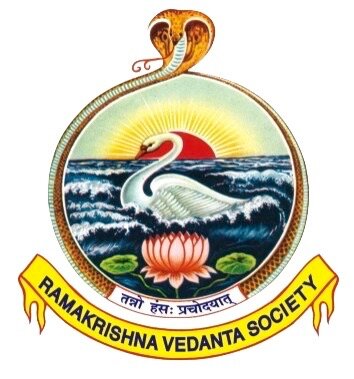From Medford Mercury, March 27, 1896
LECTURE BY SWAMI VIVEKANANDA
“The Ideal of a Universal Religion” the Subject of His Discourse.
“The Ideal of a Universal Religion” was the subject of a lecture given before a goodly audience at Grand Army hall last Friday afternoon. The lecturer was Swami Vivekananda who arrived in Boston from Detroit the day before and was accorded a warm reception in Boston by the Procopeia Club at their club house on St. Botolph street in the evening. Mr. Swami Vivekananda belongs to no sect and can be said to stand for religious ideas purely his own. He spoke, in brief, as follows:
“Wheresoever our senses reach, or our minds can imagine, we find action and reaction of the two forces, one counteracting the other, causing the constant play of these two, the mixed phenomena that we see around us or feel in our minds. Religion is the highest plane of human thought, and herein we find that the actions of these two forces have been most marked. Yet from the midst of this din and turmoil and strife and struggling, the hatred and jealousy of religions and sects, from time to time, arise potent voices, crying above all this noise, making themselves heard from pole to pole, as it were, for peace, for harmony. Will it ever come?”
After detailing the differences of opinions on each of the three parts into which every religion is divided, the doctrines, the mythology and the ritual, he asked, “How is it possible then to have a universal religion? That already exists. It is hard to find any universal ideas in this and yet we know they exist. If I am certain of anything here it is this, humanity which is a common quality among all, and that humanity is what we call God. ‘In Him we live and move and have our being.’
“Unity in variety is the plan of the universe. Just as we are all men, so we are all separate. We find then that, if by the idea of a universal religion is meant tone and set, and that the doctrines should be believed in by all mankind, it is impossible. Differentiation made us formed beings and perfect balance will be destruction.
“By a universal religion I do not mean a universal philosophy, or a universal mythology, or a universal ritual, but I mean that this would needs [?] go on wheel within wheel. What can we do? We can make it run smoothly, lessen the friction, by recognizing variation. We must learn that truth can be expressed in a hundred thousand ways, and each one yet be true. We must learn that the same thing can be viewed from many different standpoints and yet be the same thing. So far, theoretically, it is all right, but how to practically work it out? I also have a little plan. I would first ask mankind to recognize the maxim, ‘Do not destroy.’ Iconoclastic reformers do no good to the world.
“Help, if you can; if you cannot, fold your hands and stand by. An external teacher can remove obstructions, and there his duty ends. There is no other real teacher but your own soul. In mankind there are some types, which in a general way, include all natures: First, the active mind; second, the emotional mind; third, the philosopical mind; fourth, the mystical mind. Now a religion to satisfy the largest portion of mankind, must be able to supply food for all these various minds, and this is wanting. The existing sects are all one-sided. This union of all types is called Yoga, and the four divisions are known in our philosophy as Karma Yoga, the secret of work; Bhakti Yoga, the Yoga of devotion; Gnana [Jnana] Yoga, the philosophical Yoga; Raga [Raja] Yoga, the mystical Yoga. The truth in all of these is the same, but they are four different methods of reading this truth, and they are capable of infinite sub-division.
“If every man in the world would form a sect of his own, I would welcome it as evidence that every man had some degree of religious thought.”
